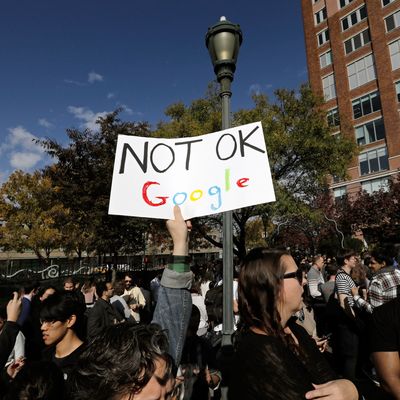
Andy Rubin, the man behind the Android, left Google in 2014. He has since received payments reportedly totaling $90 million as part of his exit package. The reason for his departure? In 2013, Rubin “coerced [a female colleague] into performing oral sex in a hotel room,” according to the New York Times. The woman later reported the incident, which Google found credible, leading to Rubin’s exit. This news, paired with stories about several other men being rewarded for awful behavior, sparked an internal movement at Google and on November 1, thousands of Google employees around the world walked out of their jobs in protest, demanding change. On Thursday, Google CEO Sundar Pichai — who was publicly supportive of the walkout, likely because reacting any other way would be a terrible PR look for an already tarnished organization — announced that the company has updated its sexual harassment policies.
The organizers behind the Google walkouts published a list of actionable demands, including ending forced arbitration for harassment and discrimination and a “commitment to end pay and opportunity inequity.” Pichai’s note — the announcement was circulated in a company-wide email — does not directly address those demands, but instead says the changes were inspired by “feedback” and “stories” Google received from its employees in recent weeks.
Arbitration will now be optional for “individual sexual harassment and sexual assault claims,” Pichar writes. (He does not address discrimination claims.) The company will also begin providing more detailed information about the process and outcomes in sexual harassment investigations. These details will include “the number of substantiated or partially substantiated concerns over time, by function. It will also discuss trends, disciplinary actions taken, and substantiation percentages.” Google says it will annually release a report on offenses that were and were not fireable. The company will also provide more support to employees who report, including counseling and allowing them to bring a companion with them during HR investigations.
The update does not address the walkout organizers’ demand that the company be transparent about any exit packages awarded to those who are forced out of the company following investigation. It does not, as the organizers asked, create a position for a worker representative on the Board of Directors. It also offers no information about the demand for data on the number of people who report sexual assault and harassment and ultimately leave Google. Sexual harassment training will now be mandatory every year, instead of every two years, and Google says it will be punishing those who do not comply by giving them demerits that will impact annual reviews.
Are these updates good? Sure. And they are certainly better than nothing. But “better than nothing” isn’t really a victory. The changes aren’t nearly comprehensive enough and instead read like a list of things you’d have thought a so-called progressive company would already have implemented from the start, and not simply in response to scandal. And there’s something grossly infantilizing about the section of the announcement devoted to reminding Google employees that “the onus will be on leaders to take appropriate steps to restrict any excessive consumption among their teams.” “Harassment is never acceptable and alcohol is never an excuse,” the section (correctly) states at the outset, before delving into details on teams using drink tickets to limit alcohol consumption. As though the basic logic that you shouldn’t black out and harass or assault your coworkers shouldn’t be enough to keep Google employees from doing so.
Pichai’s note also fails to address the demand for pay and opportunity equity, two structural issues that foster a workplace culture riddled with toxic behavior. Toxic behavior which, in turn, people like Andy Rubin can get away with with no real consequences. (Richard DeVaul, another senior employee mentioned in the Times story for harassing a female Google applicant, resigned just before the walkout.)
Even if Thursday’s changes do mark incremental progress and make Google a slightly improved and safer workplace, those benefits don’t extend to everyone in the Google family. TVCs — Google-speak for contract workers — did not receive the email, and a tweet from the Tech Workers Coalition notes that the changes do not afford them the same protections as their full-time colleagues. TVCs, the TWC also notes, “make up over half the Google workforce and are disproportionately women and people of color.” Sundar Pichai, and his colleagues, are clearly trying to make Google a better environment. They’ve got a ways to go before they can actually make it a good one.





























